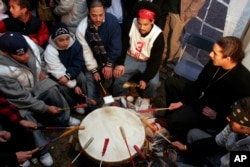Gaming has boosted many Native American tribal economies and made some tribes rich, like the Shakopee Mdewakanton, whose Minnesota casinos earn tribe members $1 million a year. But the road to casino riches can be rocky, as the Mashpee Wampanoag tribe of Massachusetts has discovered.
The government's Bureau of Indian Affairs, or BIA, recognized the Mashpee in 2007, satisfied the tribe had operated as a community since colonial times and that 97 percent of tribe members descended from the historical tribe.
In 2015, BIA designated about 130 hectares of land in trust as the Mashpee’s reservation: 60 hectares in the town of Mashpee and 70 hectares of land about 56 kilometers away in the town of Taunton.
“This was one tenth of one third of our total tribal base,” said tribal chairman Cedric Cromwell, who says his people were among the first to greet English settlers at Plymouth. “We initially had 14,000 square miles (36,000 square km).”
For years, the Mashpee had wanted to build a $1 billion casino resort in Taunton and agreed to pay the state 17 percent of all their earnings — on condition that no other casinos be allowed to compete in the region. The town approved their plan and the tribe borrowed money to start construction.
‘Not real Indians’
But they had competition: In early 2013, a Chicago casino developer submitted a bid to Massachusetts to build a $1 billion casino resort just 24 kilometers away from the Mashpee casino site.
Weeks before the Mashpee were due to break ground, 24 Taunton residents filed suit against the federal government, alleging that the Mashpee weren’t truly “Indian” and therefore did not deserve a reservation. That suit was funded in part by the rival Chicago developer.
Even after the state turned down the Chicago bid, a U.S. District judge ruled against the Mashpee and referred the matter back to the BIA “for further proceedings consistent with this opinion.”
Since then, the tribe has been in limbo. It has halted construction and is now hundreds of millions in debt, with no other source of income.
Chairman Cromwell believes the lawsuit was racially motivated. "The litigants said, ‘We’re all for a casino in Taunton, but we don’t want an Indian casino,’” he said.
Adam Bond, the attorney who represented the lead plaintiff, denied racial motivation in an email to VOA.
“Does Mr. Cromwell believe that Judge Young is racist because he read the law and gave a correct reading of that law?” he wrote. He called the lawsuit “a clean and fair fight.”
Shifting federal policy?
The Department of the Interior (DOI), which oversees BIA, said it would decide the fate of the Mashpee’s reservation by June 2017. To date, however, no decision has been made, and it may be a long time in coming, suggests Michigan attorney Bryan Newland, an Ojibwe citizen of the Bay Mills Indian Community who specializes in Indian gaming law.
“Right off the bat, the Trump administration issued a policy memo that said any requests for tribes to put land into trust outside of existing reservations should be decided in BIA headquarters in Washington,” said Newland. “This creates a bottleneck. There are only so many staffers in the BIA who can process these applications and make those decisions.”
Moreover, 15 months into the Trump administration, the DOI still hasn’t named an assistant secretary for Indian affairs.
“The department is crafting policy, proposed policies, without having an actual Indian policy maker in place,” said Newland. “And this begs the question - where are these proposals coming from? And I think the bigger story here is that this is being driven not by Indian affairs policy makers, but a higher level. And that in turn begs another question — Why?”
Cromwell offers an answer: “I do believe this is an attempt, with what’s happening with the administration right now, to focus on detribalization and certainly take Mashpee’s land out of trust.”
BIA spokesperson Nedra Darling told VOA she can’t comment while the matter is still in litigation.
Enter Congress
In March, Rep. Bill Keating (D-Ma.) introduced the Mashpee Wampanoag Tribe Reservation Reaffirmation Act, or H.R.5244, to ward off a DOI move to withdraw the tribe’s reservation.
“Frankly, that would be unprecedented,” Keating said at the time. “That the government would take away land in trust from the Wampanoag Tribe, that has far-reaching implications.”
Massachusetts Democrats Ed Markey and Elizabeth Warren have introduced a twin bill in the Senate.
Mashpee chairman Cromwell says he remains optimistic, but acknowledges the stakes are high.
“So many programs and services are associated with trust lands for our people — housing, education, health care, elder services, and all this is at risk if our lands get taken out of trust.”











